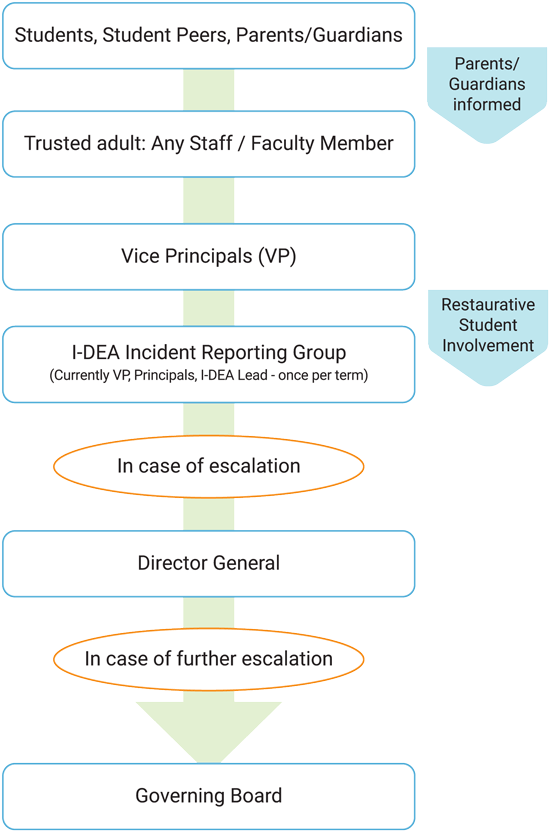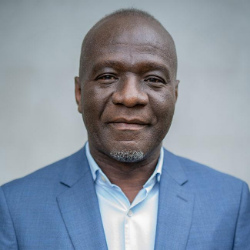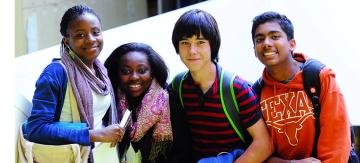Our I-DEA Vision
The International School of Geneva (Ecolint) is dedicated to embodying its mission of "Educating students to be global citizens with the courage and capacity to create a just and joyful tomorrow together" through active commitment to inclusivity, diversity, equity, and anti-racism. Our goal is unwavering: to foster a culture of openness, learning, and belonging. We recognize that true progress demands intentionality – a commitment to learning, growing, and evolving together.
Our Commitment
At I-DEA, we are resolute in nurturing an environment that celebrates differences, demonstrating respect through meaningful actions. This journey hinges on mutual learning: our focus has been on fostering dialogue, prompting introspection about ourselves and others. Through continuous learning, we enrich our educational experience, cultivating a consciously inclusive atmosphere for every member of our community. Dialogues and training serve as the cornerstone of our efforts, fostering mutual understanding, effective communication, and spaces for healing.
Our Holistic Approach
Our I-DEA vision is rooted in a comprehensive approach that encompasses all levels of our institution. From personal to institutional, cultural to interpersonal, our learning opportunities cater to every facet of our community.
Our Progress
Ecolint's journey towards greater Inclusion, Diversity, Equity, and Anti-Racism (I-DEA) is underpinned by a set of twelve critical success factors that guide our path.
- Senior Leadership Commitment: Board and Senior Management Dedicated to a Multi-Year Initiative.
- Comprehensive Inclusion: Addressing Historical 'Isms'.
- Unified Conceptual Approach: Commitment to a Shared Framework.
- Strategic Action: Planning Across Personal, Interpersonal, Institutional, and Cultural Levels.
- Internal Inclusive Diversity Groups: Transparent Selection and Operation Process.
- Resource Allocation: Defining and Allocating Essential Resources.
- Learning Laboratory: Ecolint as a Hub of Continuous Learning.
- Clear Objectives: Personal and Institutional Outcomes for the Council.
- Training Commitment: Adequate Training for Council and Senior Management.
- Cultural Competence: Senior Management Modeling Inclusive Behavior.
- Demonstrable Competencies: Defining Competencies at All Four Levels.
- Affirming Experience: Creating a Positive, Respectful Space for All Activities.
Together, we strive to uphold these factors, catalysing change and embracing diversity in all its forms.
Join us on this transformational journey as we build a community where everyone's voice is heard, valued, and celebrated. Together, we create an inclusive, diverse, equitable, and anti-racist future.
Here to Hear. Here to Help
We strive to make Ecolint a place where all community members can be themselves, free from harm caused by exclusion, discrimination or bullying based on their sex, gender, religion, ethnicity, race, nationality, language, physical characteristics, age, or any other factor. We also know, as written in our Language Guidelines (produced by our students), that “discrimination appears in everyday life” and that “its impacts reach beyond the individuals involved and affect the community as a whole”.
We therefore “acknowledge our responsibility to ensure that all are attentive to the impact of our actions and words”. Being attentive means being aware, and actively standing up for ourselves and for our peers.
If you encounter acts of discrimination, whether intentional or unintentional, it is important that you share your concerns. These concerns will not be overlooked. We will work with you to ensure that you are listened to, heard, and appropriate action is taken.
WE ARE HERE TO HEAR YOU. WE ARE HERE TO HELP YOU.
Students may approach any adult working in the school. Together, we will find restorative and appropriate solutions. Listening will make us more aware of what each of us needs to feel a sense of belonging.
See below the flow chart of how the information is processed by the Foundation:

EthicsPoint
If you are not confident reporting an incident of a discriminatory nature via the routes outlined above, Ecolint has also arranged for an independent organisation to assist you. While reports made to EthicsPoint will be shared with the school, no personally identifiable information will be shared without your consent.
ETHICSPOINT - INDEPENDENT 24/7 HOTLINE
This hotline should not be used to report a Child Protection concern, as it makes it much harder for the school to intervene to protect the child who is at risk without being able to speak first hand to those who have information of the incident.
For any questions or queries, please contact our Head of Inclusion, Gilbert Ekotto at gilbert.ekotto@ecolint.ch or our I-DEA Lead, Yasmine Sadri at yasmine.sadri@ecolint.ch.


